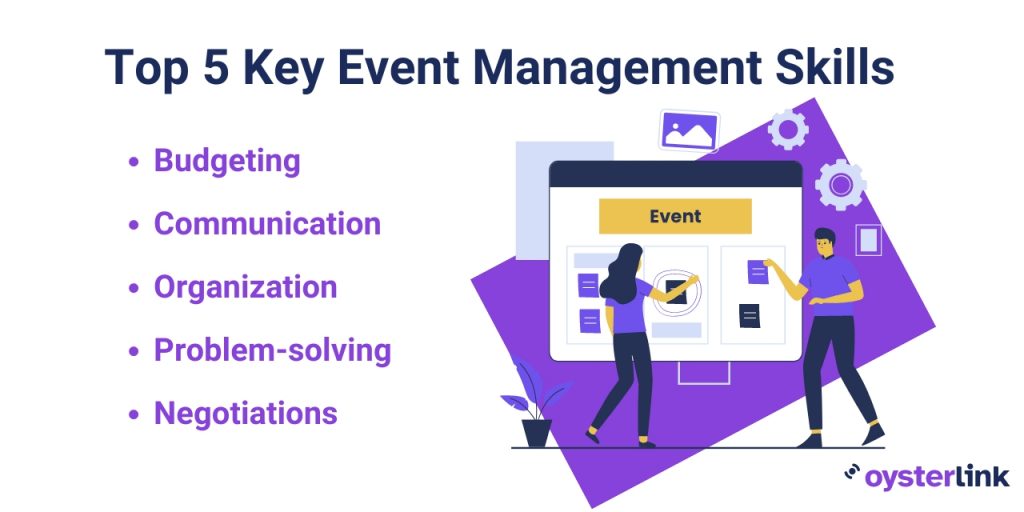Event management is a dynamic and fast-growing industry, offering a blend of creativity, organization and rewarding experiences. With the event industry is estimated to surpass $150,000 million by 2032, it’s clear why so many people are drawn to this career path.
Whether you’re planning corporate conferences, weddings, festivals or trade shows, this industry is full of opportunities. This guide will show you how to break into event management with no experience and outline some of the most profitable roles available.
Unlike many other careers within hospitality, starting in Event Management can be relatively straightforward. In this article, you’ll learn which steps to take to not only get into event planning with zero experience but also explore some of the most profitable and rewarding roles.
Things To Consider When Starting Off in Event Management
Just like every other industry, being a part of the event planning sector has its pros and cons. If you’re a people person who thrives in a fast-paced environment, you’ll likely love this job. You’ll get to build connections in all walks of life, which can significantly advance your career.
However, it’s also worth noting that event planning often involves working under pressure and managing high levels of stress. You might be tasked with responsibilities beyond your job role and have to juggle multiple tasks at once.
Being mentally and physically prepared for the dynamic nature of event planning is crucial to avoiding burnout and thriving in this career.
Understanding the Event Management Industry
The event management industry encompasses a wide range of events, including corporate conferences, weddings, festivals, trade shows and more. It involves the application of project management principles to the creation and development of large-scale events. Understanding the industry’s scope and the various types of events can help you identify your areas of interest and specialization.
Roles in Event Management
To get into the field, consider becoming an Event Coordinator. To succeed in this role, you should have excellent time management and organizational skills. Even though Event Coordinator is usually considered an entry-level role, they work closely with managers and their role is crucial in preparing a successful event.
After spending a couple of years as an Event Coordinator, you will be eligible to become an Event Planner. As an Event Planner, you will be tasked with more serious responsibilities such as conducting market research, communicating with vendors and ensuring client satisfaction.
Ultimately, if you spend a lot of time in the event management industry, you will advance to an Event Manager. This role demands exceptional attention to detail and the ability to oversee an event from inception to completion, often guiding a team through every stage.
Specialized Roles in Event Management
Beyond the general roles, the event management field offers specialized positions that cater to specific event types and functions:
- Wedding Planner: Focuses on organizing and coordinating all aspects of weddings, ensuring the couple’s vision is brought to life.
- Venue Manager: Oversees the operations of event spaces, managing bookings, coordinating with clients, and ensuring the venue meets the event’s requirements.
- Event Marketing Specialist: Responsible for promoting events to target audiences, utilizing various marketing strategies to maximize attendance and engagement.
Gaining Practical Experience in Event Management
Practical experience is invaluable in event management. Here are ways to gain hands-on experience:
- Volunteer at events: Offer your services at local events to understand the dynamics of event planning and execution.
- Shadow an Event Manager: Learn directly from professionals by observing their day-to-day activities and understanding the nuances of the role.
- Internships: Apply for internships with event planning companies to gain structured experience and build a professional network.
How To Get Into Event Management With No Experience
Breaking into event management might seem daunting, but it’s possible even without prior experience. Here are some steps you can take to start your journey:
1. Study marketing and public relations
Good marketing and PR campaigns play a major role in organizing a successful event. The best part is that these skills are 100% transferable to any job.
For example, if you’ve worked in sales, customer service, or project management, you already have a strong foundation. Consider expanding your skill set by taking relevant courses or learning on the job.
2. Network with successful professionals
If you’re just starting out in the field, you can learn a lot about the industry from reputable professionals. If you don’t know anyone in your surroundings, you can attend events or seminars where these experts meet.
Engaging with online communities and forums dedicated to event management can also provide valuable insights and connections.
LinkedIn is also a great place to participate in industry-specific discussions and connect with like-minded individuals as well as established professionals from reputable companies.
Building a strong network can open doors to mentorship and job opportunities.
3. Work towards obtaining a certification
Consider obtaining an event management certification. Some reputable universities and industry organizations offer degrees in event management and you can also explore specialized courses.
Consider certifications such as the Certified Meeting Professional (CMP) or the Certified Special Events Professional (CSEP) to enhance your qualifications. These certifications can provide a competitive edge and demonstrate your commitment to the profession.
Employers often prioritize candidates who have certifications, even if they lack experience. This can set you apart from other applicants.
Educational Pathways in Event Management
While not always mandatory, formal education can provide a solid foundation in event management. Consider the following options:
- Bachelor’s degree: Pursue degrees in event management, hospitality, marketing or related fields to gain comprehensive knowledge.
- Diploma programs: Enroll in diploma programs that offer specialized training in event planning and management.
Earning industry-recognized certifications can enhance your credibility and open up advanced career opportunities in event management. Consider pursuing certifications such as:
- Certified Meeting Professional (CMP): Recognizes individuals who have demonstrated a high level of experience and skill in meeting management.
- Certified Special Events Professional (CSEP): Denotes expertise in all aspects of event planning and management.
- Certified in Exhibition Management (CEM): Focuses on exhibitions and events, emphasizing best practices in the industry.
Top 5 Must-Have Skills in the Event Management Industry
To excel in event management, focusing on specific skills is key. Here are five essential skills for a successful career in this industry:
- Budget management: Unlike the entry-level roles, as a planner or a manager, you will be expected to set up and manage the budget for the entire project.
- Communication skills: Your job will be to communicate with clients and vendors on a daily basis, which is why you should have great communication skills.
- Organizational skills: Organizing an event requires someone who can not only lay out the structure but also follow up consistently to ensure everything is running smoothly for the big day.
- Problem-solving skills: If you’re working in the event planning sector, you know by now that there’s often additional stress before the event takes place. To address these issues as soon as possible, you should be quick on your feet.
- Negotiation skills: You should excel at negotiation as you will be regularly dealing with stakeholders, vendors and suppliers.

Common Challenges in Event Management and How To Overcome Them
Event management is a rewarding field, but it comes with its set of challenges. Understanding these obstacles and knowing how to address them is crucial for success.
- Underestimating complexity: Planning events involves numerous details that can be overwhelming, especially for newcomers. To mitigate this, develop a comprehensive checklist and timeline to ensure all aspects are covered.
- Lack of creativity: Events should be engaging and memorable. To enhance creativity, stay updated with industry trends and incorporate innovative ideas to make your events stand out.
- Managing stress and high-pressure situations: The fast-paced nature of event planning can lead to stress. Practice effective time management, delegate tasks when possible and maintain a healthy work-life balance to manage stress levels.
Building a Profitable Career in Event Management
Event management offers a clear path to higher salaries as you gain experience and expertise. As an entry-level Event Coordinator, you can expect to earn around $54,362 per year.
As you hone your skills, advancing to an Event Planner can boost your annual earnings to $62,280. Bear in mind that salaries vary depending on your location and the type of events you manage.
More senior roles such as Event Managers earn $78,729 per year in the U.S. Other similar roles, such as Event Directors, Vice Presidents of Events or Chief Event Officers are entitled to even higher salaries and more lucrative bonuses that come alongside more responsibilities.
Successful events can often lead to performance-based bonuses, which may significantly increase your earnings.
Current Trends in Event Management
Staying abreast of industry trends is essential for a successful career in event management. Here are some current trends shaping the industry:
- Hybrid events: Combining in-person and virtual elements to reach a broader audience has become the new normal.
- Sustainability: There’s a growing commitment to eco-friendly practices in event planning, such as reducing waste and choosing sustainable venues.
- Personalization: Tailoring event experiences to individual preferences to enhance attendee engagement.
FAQs About How To Get Started in Event Management
While formal education isn’t always required, having a degree in hospitality, event management, marketing, or a related field can be advantageous. Certifications from reputable institutions also provide a competitive edge.
Yes! Many professionals start with entry-level roles, such as Event Coordinators and work their way up. Building a strong network and gaining certifications can improve your chances.
Focus on building key skills such as communication, problem-solving and negotiation. Networking, volunteering at events and gaining relevant certifications can also help you stand out.
While not always required, certifications can enhance your credibility and demonstrate your commitment to the profession. Programs like the Certified Meeting Professional (CMP) or Certified Special Events Professional (CSEP) can provide specialized knowledge and may improve job prospects.
Networking is vital in event management. Building relationships with industry professionals can lead to job opportunities, collaborations and mentorships. Attending industry conferences, workshops and joining professional associations are effective ways to expand your network.

Written by Lidija Misic
Content Specialist
Lidija holds a BA in English Language and has lived in five different countries, where she has worked in various roles, including as a flight attendant, teacher, writer and recruiter. Her biggest passion is crafting great content and reading. She is particularly passionate about creating punchy copy that inspires people to make positive changes in their lives.

Reviewed by Stefan Petrov
With over 10 years of experience as a writer and editor, Stefan has worked in the automotive, IT, health and hospitality industries. Familiar with Google Search Console and other SEO tools like Ahrefs and Semrush, Stefan uses his experience to create content that’s visually appealing to the user but also ranks in the SERPs.




